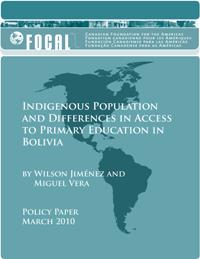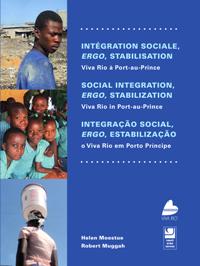 Twenty years after education reform, Bolivia has changed an array of policies to improve access to quality education. Despite some progress, the Canadian Foundation for the Americas’ study, Indigenous Population and Differences in Access to Primary Education in Bolivia, finds that families’ socioeconomic status is still the most important factor affecting educational attainment. The gap between indigenous and non-indigenous Bolivians in eighth grade completion has not changed. The report offers a series of recommendations to address this issue.
Twenty years after education reform, Bolivia has changed an array of policies to improve access to quality education. Despite some progress, the Canadian Foundation for the Americas’ study, Indigenous Population and Differences in Access to Primary Education in Bolivia, finds that families’ socioeconomic status is still the most important factor affecting educational attainment. The gap between indigenous and non-indigenous Bolivians in eighth grade completion has not changed. The report offers a series of recommendations to address this issue.
Frustrated observers lament shortcomings in the development of the hemisphere’s vast energy resources. Despite the economic and national security rationale for regional energy coordination, the region is divided by political tensions, resource nationalism and technical challenges. A new study, Cooperación Energética en el Hemisferio Occidental: Beneficios e Impedimentos (Energy Cooperation in the Western Hemisphere: Benefits and Barriers) by Colombia-based Centro de Estudios Estratégicos Latinoamericanos looks at why and how the region needs to pull together for energy cooperation.
 The international community has been a fixture in Haiti since the end of the reign of the Duvaliers. Less present has been the developing world’s nongovernmental groups, which can offer unique insight and collaboration. Integração Social, Ergo, Estabilização (Social Integration, Ergo, Stabilization), a report by Rio de Janeiro-based NGO Viva Rio highlights efforts to transplant some of its grassroots programs to Port-au-Prince. The organization works with local NGOs on projects ranging from community outreach and neighborhood “greening” initiatives to child soldier pacification. The overarching theme, of course, is South-South cooperation.
The international community has been a fixture in Haiti since the end of the reign of the Duvaliers. Less present has been the developing world’s nongovernmental groups, which can offer unique insight and collaboration. Integração Social, Ergo, Estabilização (Social Integration, Ergo, Stabilization), a report by Rio de Janeiro-based NGO Viva Rio highlights efforts to transplant some of its grassroots programs to Port-au-Prince. The organization works with local NGOs on projects ranging from community outreach and neighborhood “greening” initiatives to child soldier pacification. The overarching theme, of course, is South-South cooperation.




